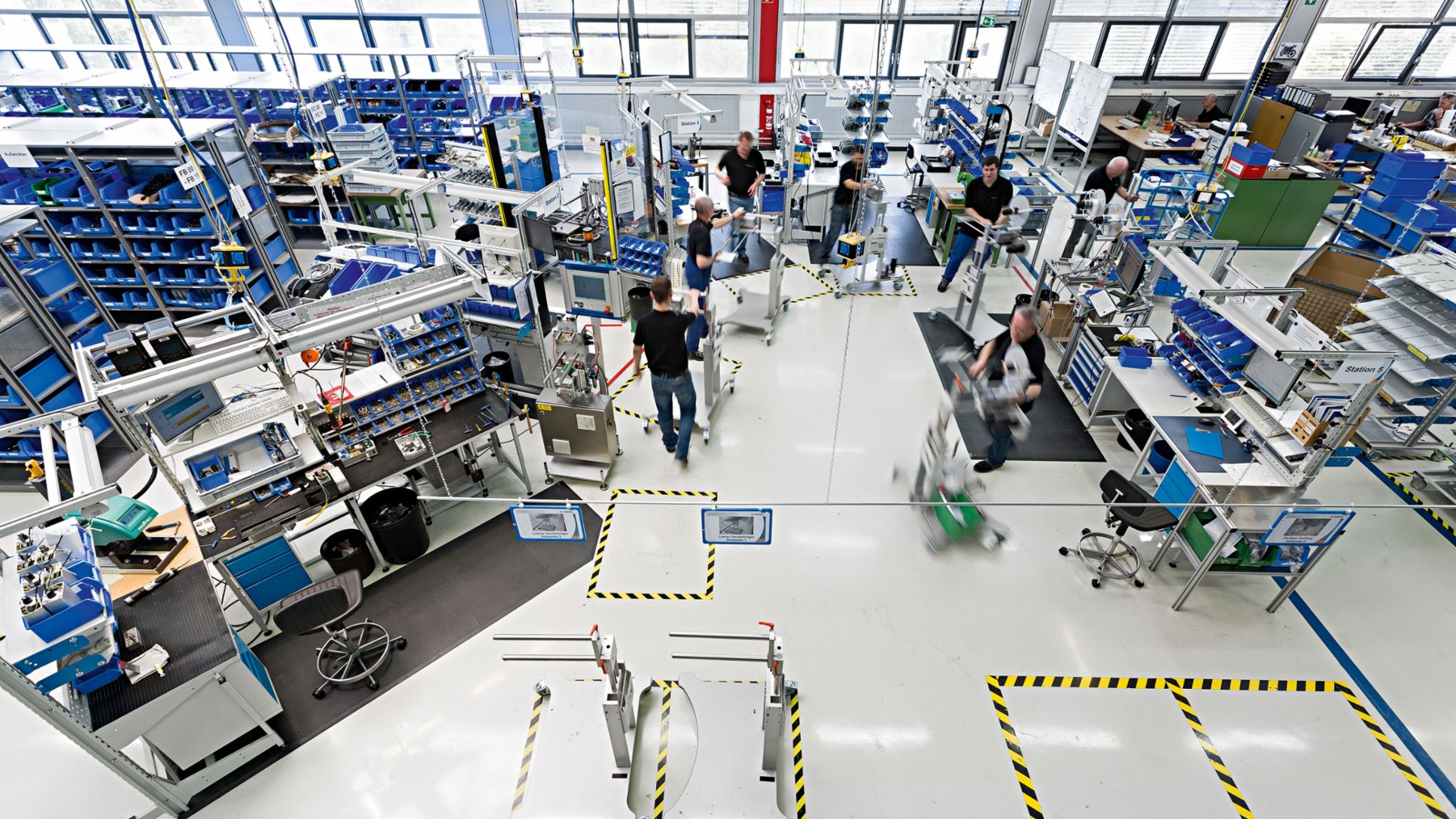A bottle of shampoo or a box of medications, a cosmetic item or food in a glass container— “Six times a day the average consumer in Europe holds a product that has passed through one of our labeling machines,” estimates Martin Kühl, the director of the labeling machine division at Herma, one of the world’s leading companies for self-adhesive systems. Headquartered in Filderstadt, a town on the outskirts of Stuttgart in southwestern Germany, the company is part of the Herma Group, which has 848 employees and posted 261 million euros in sales in 2013. “With this new record level of sales, our growth has once again outstripped the market,” says Herma’s Managing Director Sven Schneller. The labeling machine division showed the highest relative growth, with an increase of more than twelve percent. And Herma has defined an ambitious aim for precisely this division—to double its sales and profit within eight years.
It all started more than a century ago with a few labels for an ambitious car-making company by the name of Daimler, which today is a worldwide corporation selling high-end automobiles. In 1906, printing press owner and company founder Heinrich Hermann decided to concentrate on embossed labels and merchandise tags for the waves of new industrially produced goods. The company rapidly took over the market with its top-quality products, and opened its first office abroad in England in 1913. A pioneering spirit and new product ideas not only provided fresh impetus to sales in the 1920s but also laid the foundation for the company to develop its own production machines. Another crucial step in long-term success took place in the 1950s, when it developed its own processes for self-adhesive paper and adhesive coatings.
A sector known for specialized solutions and small unit volumes
Herma’s adhesive materials division has remained a leader in technology worldwide. Among other innovations, the company developed a process that enables various ad-hesive coatings to be applied simultaneously. This means that labels whose coatings must not migrate through the packaging on food items, for example, can also be used with conventional adhesives. “As far as we know no one else is currently using this multi-coating technology on an industrial scale,” says Herma boss Schneller.
Herma’s industrial division has increased its business with large-scale international customers, whose sites throughout Europe can be centrally supplied from Filderstadt. Another engine for growth is the online business, which has helped to meet an ever-growing demand for mail-order labels. Herma is also the leader in technology for label applicators—the core component of every labeling system. With the HERMA 400, the company was the first to bring a generation of equipment with integrated control systems onto the market. This represented a major advantage, given that labeling machines must often be integrated into very small spaces in existing production lines.
“In a sector still dominated by special solutions and small numbers of customized machines, Herma was also the first to recognize the advantages of large-scale series production,” says Martin Kühl. The external geometry of the labeling machines has remained essentially the same, while making it possible to precisely meet customer needs via the integrated software and electronics Herma produces around 2,500 labeling machines every year, all with the same basic form of this standardized model.
The aim is double sales
That figure pushed the limits of the existing capacity, however. So the company set itself two aims: to increase its efficiency and to expand its product range in preparation for its “HERMA 2020” project to double the sales and profits of its labeling machine division. To achieve these two aims, Herma sought the support of Porsche Consulting.
In 2003, when the HERMA 400 labeling machine set new standards worldwide and started becoming a bestseller, it was manufactured on an island-style production set-up. There were eight work stations at which eleven employees assembled the machines to fill customers’ orders. Thousands of variations are possible. The HERMA 400 modular system enables left- or right-hand versions in vertical, horizontal, or suspended forms with installation widths of 80 to 320 millimeters. There are also supplementary modules for integration into customers’ individual production lines, in addition to customized models.
Working closely together with Principal Martin Kühl, the experts from Porsche Consulting developed a concept for an efficient line-style production system. As part of the preparation for this, Herma’s employees visited Porsche’s main plant in Zuffenhausen to learn about the benefits of taktbased production with precisely defined content for each step. They then tested it themselves in a simulation using boxes, which illustrates the advantages of lean production. “Because the employees had become used to a certain type of working routine,” says Kühl, “we put a lot of effort into persuading them. The visit to the Porsche plant was very important in this regard. Seeing something work with your own eyes is always the most impressive demonstration.”
The ideal takt does not put employees under stress
When the concept was set, the company changed the complete production process for the HERMA 400 in a single week. Extensive inventory levels at the warehouse and work stations gave way to a contract-based system of drawing and distributing materials. This significantly reduced the amount of space needed. Instead of the previous long work benches, there are now five compact work stations set in a circle. Each machine makes a round of these stations on a mobile assembly platform. A precision analysis of the assembly steps and how to divide them equally yielded a takt of 37 minutes. “We defined this period of time as the ideal takt without adding any stress to the employees’ tasks,” says Kühl. “They can now work in much a calmer and more organized manner than before.”
The throughput time per machine dropped by 75 percent, on a production area of 180 square meters—which is just about half the previous size. Assembly and logistics now only require six instead of the previous eleven workers. “We had an urgent need for the other five elsewhere,” says Kühl, “for example, in producing special-order customized machines.”
Right after transforming the production system, Herma tackled the second growth project, also with the support of Porsche Consulting: to design a new baseline labeling machine. “We’re talking about a basic model that retains the Herma virtues but that can be priced considerably more attractively because its features have been streamlined,” explains Principal Kühl. As the idea for the HERMA basic took shape, it looked like there wouldn’t be enough time to develop it before the Interpack, the world’s most important packaging trade show, which is held in Düsseldorf. “We initially assumed that we wouldn’t be able to offer our customers a new product to meet their needs until 2015,” recalls Kühl. “But instead, we have been on the market since the Interpack trade show in May 2014 and setting another bench-mark in our industry.”
New products go onto the market faster
The HERMA basic is already starting to fill order books and is now being produced together with the HERMA 400. It can easily be integrated into the line production system, and additional capacity is available. “We’ve seen in several projects now that we can achieve what first appeared to be impossible—with the help of Porsche Consulting,” says Kühl. Upcoming projects are also expected to be put into practice more promptly and new products will be coming sooner onto the market. Herma fully expects to enjoy a key advantage on the market as a result. “The smooth interaction between Porsche Consult-ing and its top-flight experts and our experienced, dedicated technicians and engineers resulted in a significantly improved process structure. Each one of them deserves our respect and recognition. The adjustment was a challenge—but one that everyone enjoyed. And we can easily envision our teamwork mov-ing forward,” says Chairman of the Board Sven Schneller.
Info
Text first published in „Porsche Consulting - THE MAGAZINE", Issue 15
Author: Peter Weidenhammer




